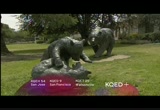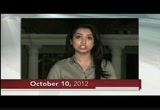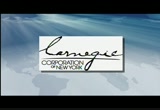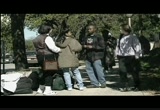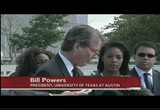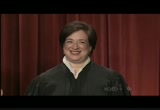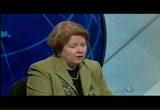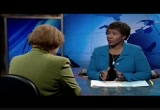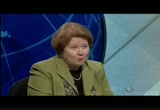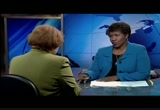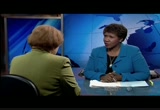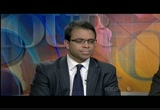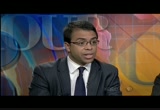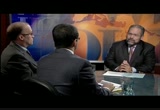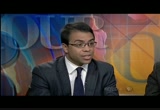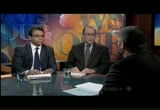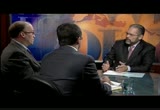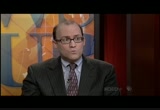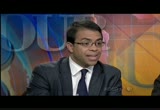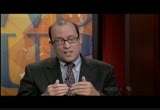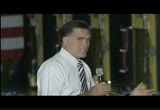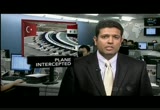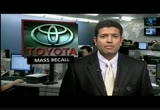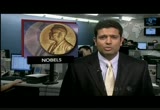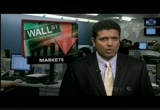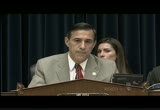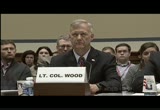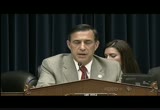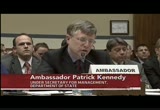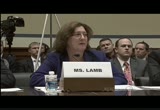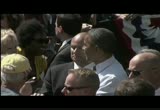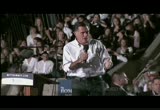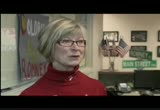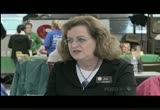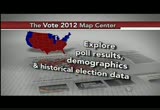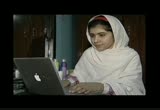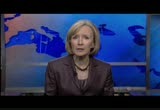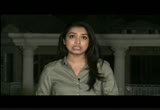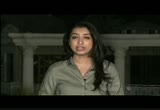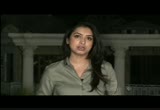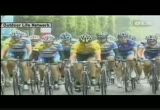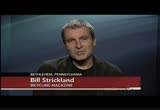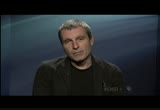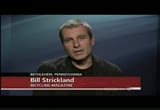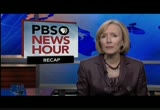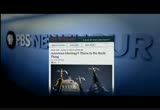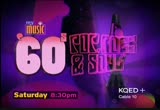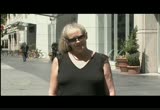tv PBS News Hour PBS October 11, 2012 12:00am-1:00am PDT
12:00 am
captioning sponsored by macneil/lehrer productions >> ifill: affirmative action came under fire today at the supreme court in the case of a white student denied admission to the university of texas. good evening, i'm gwen ifill. >> woodruff: and i'm judy woodruff. on the "newshour" tonight, we talk with marcia coyle about today's arguments and ray suarez looks at the wider implications of the case for public institutions nationwide. >> ifill: then, jeffrey brown gets the latest on the congressional probe into
12:01 am
security failures at the u.s. consulate in libya. >> woodruff: we head to colorado, where the presidential candidates are targeting suburban voters. >> some of the things romney supports, i don't think are conducive to women's issues and as a business owner, i don't think obama is a good choice. >> ifill: outrage in pakistan, after an outspoken 14-year-old was shot by the taliban for promoting education for girls. >> woodruff: and we examine new evidence that lance armstrong was at the center of a sophisticated professional doping program, including testimony from his former teammates. >> ifill: that's all ahead on tonight's "newshour." major funding for the pbs newshour has been provided by:
12:02 am
12:03 am
>> ifill: the supreme court heard arguments today in one of the most closely watched cases of the term. it marked a return to the decades-long legal debate over affirmative action. the scene outside the supreme court building made clear just how anticipated this case has been. for the first time in nearly a decade, the justices are considering whether it's constitutional for universities to use race in deciding who they admit. the suit was brought by abigail fisher-- a white, honor roll student who was denied admission at the university of texas at austin in 2008. fisher, now 22, was in the court chamber today and later spoke briefly to reporters. >> i hope the court rules that a student's race and ethnicity should not be considered when applying to the university of
12:04 am
texas. >> ifill: her lawyer, bert rein, said it comes down to equal protection under the law. >> we've recognized that there are some interests in diversity that are beneficial in the educational sphere. but we have said and we continue to say that is not an overriding consideration that has to be administered very narrowly because it's an odious and dangerous classification. >> ifill: but university president bill powers argued that concern is trumped by the need for a diverse student body. >> we believe the educational benefits of diversity are so important that they're worth fighting for all way to the united states supreme court. our lawyers this morning effectively made the case to the justices that diversity-- ethnic and otherwise-- benefits all of the students on our campus. >> ifill: the high court last visited the issue in 2003, deciding five to four to let the
12:05 am
university of michigan law school could use race as one factor in its admissions process. before then, the university of texas guaranteed acceptance for the top 10% of students at every high school in the state. but after the michigan decision, texas and other schools added race as a factor for applicants who are not guaranteed admission under the top 10% plan. the eight justices who heard today's arguments must now decide whether that two-tiered system passes constitutional muster. justice elena kagan is not taking part. she recused herself after working on the case as solicitor general under president obama. >> ifill: for more on today's arguments, we turn as always to marcia coyle of the "national law journal." she was in the courtroom this morning and is back with us tonight. mash ahow did the university of texas attorneys defend their policies? >> well, the university said that race under its plan is one
12:06 am
of roughly a dozen fasters that are considered when a student is going to be considered for admission into the university. that there is no quota. that the plan as constructed and administered and implemented, follows all of the guidelines that the supreme court set down under the gretter decision in 2003. the justices, gwen, have divided by race in the past. so it wasn't surprising that that divide play out again during the arguments today. hujustices more moderate to liberal, such as justices breyer and soto mayor and ginsberg being concerned that abigail fisher was asking the court to overrule the grutter decision. justice breyer, for example, pointed out that two lower courts here had looked at texas' plan and found it did meet all the requirements under grutter,
12:07 am
so he pressed miss fisher's lawyer as to why do you say it doesn't satisfy grutter, and mr. rein, representing miss fisher, argued texas never considered race-neutral ieflts after the 10% plan went into effect to see if it could achieve what grutter calls a critical mass of underrepresented student. i use "critical mass" because it became important when the more conservative justices began questioning the university's attorney, gregory garre. and how as chief justice roberts said, how do you measure critical mass? under the 14th amendment, when classifications are made on the basis of race, the court applies its strictest scrutiny and says the racial
12:08 am
classification has to be narrowly tailored to achieve a compelling state or governmental interest. and chief justice roberts said how do you define critical mass and if you can't define it, how can we measure whether your plan is narrowly tailored. >> and how do you represent a state government. how was the court in 2003 when affirmative action was upheld then, and now there's a possibility it won't be because of the terms of this particular case? what's different about the court? >> well, the composition of the court has changed. the grutter decision was 5-4 which chief justice ren quest was chief. it was a decision by justice sandra day, o'connor, who was in the courtroom today of the guest seats of the justices. >> ifill: is that unusual? >> she has come occasion amy but i think she has a special interest in this case. you have new justices. you have four new justices on the court.
12:09 am
but with the absence of justice kagan in this case, you're dealing with eight justices, the possibility of a 4-4 split. also, justice kennedy has always been the key vote in these race-based cases. he asked very few questions today, so he didn't really reveal-- >> ifill: you couldn't really read him. >> no, you couldn't. but i will say this about justice kennedy in these types of cases -- he has never found an affirmative action plan that he feels is constitutional. but he always holds out the hope that there is one out there. >> ifill: so this is not-- this is basically take the power away from colleges to make the decision about what's acceptable, and let the courts decide it? >> it depends on how the court-- how the court views the grutter decision. mr. rein for abigail fisher, was takintake talking about how gru- i guess you could say tweaked, reworded, to make clear when race can be used.
12:10 am
justice sotomayor said she thought he was saying grutter ought to be gutted. i think the court-- we'll have to wait and see how the court applies gruttener this case. >> ifill: whether it's possible for any of it to stand if they rule against the university. >> exactly. it's important to remember that texas' 10% plan is not being changed here and it has resulted some some increased diversity, most universities don't have the 10% plan. >> ifill: a fall-back plan, in other words. >> exactly. >> ifill: to achieve maybe the same end. if justice kagan has recused exphers there's the possibility at least of a 4-4 decision, what would happen? >> that would leave in place the lower court's decision, and that was by the u.s. court of appeals for the fifth circuit, which, by the way, is it one of the more conservative federal appellate courts in the country. that court ruled in faif of the university. not surprisingly, too, gwen, this case has attracted a large number of amicus briefs, more
12:11 am
than 90 ameekus briefs. and they have come across the spectrum, on the side of the university, roughly 70 of those 90 briefs. and they've come from military leaders, businesses, as well as civil rights organizations. >> ifill: and this laib test whether any of those kind of things matter, i suppose. >> absolutely. >> ifill: marcia coyle. >> ifill: ray suarez has more on the larger stakes and potential fallout arising from today's arguments. >> suarez: and for that, we turn to two people who have been a big part of the national conversation surrounding this case. debo adegbile is the acting president and director-counsel of the n.a.a.c.p. legal defense and educational fund, which filed an amicus brief in this case. and richard kahlenberg is a senior fellow at the century foundation. he wrote a recent report arguing for race-neutral admission policies that he says foster diversity. you were at the court, debo. what's at stake under coming
12:12 am
classes of rising freshmen and their families seeking admission to public universities in this case? >> well, the stakes are very high. it's clear that everybody recognized today that diversity in higher education is a compelling interest. it's something that benefit all the-- all the students benefit from-- blark white, latino, asian. everybody benefits from these cross-racial interactions. and too many of our high schools are racially identified. there's lot of residential segregation leading to segregation in school, not by law but by practice. the result is too many kids don't have these interactionsess until they get to college and are able to learn from each other and break down stereotypes. the ramification of this case could be far reaching depending on how the court rules. >> richard kahlenberg, far-reaching? >> absolutely. this goes to what we mean by equal opportunity in our
12:13 am
society. should race count in deciding who gets ahead? how do we create racial diversity in our universities? i agree with debo that it's very important that our leading institutions of higher education have students of all different racial and ethnic groups. my concern with the current affirmative action is that essentially, universities assemble wealthy kids of all colors, and we're not getting that genuine diversity that has to do also with socioeconomic status. >> suarez: debo, you mentioned patterns of organizing high schools by using the 10% plan, by basically taking the top finishers in senior classes. didn't attack take race out of of the equation by saying the top students from this high school, whatever color they are, are in? >> in some sense it does d. using the top 10% plan is racially neutral on its face.
12:14 am
it's based in a history of segregation and discrimination in texas that gives us the howing pattern that you find. for a long time the schools in texas were segregated by the rule of law. indeed, last time, many decades ago that the university of texas was in the supreme court onadmission policy it was on the wrong side of history. it was trying to keep emen swettpositive an african american who wanted to attend the law school out, and thurman marshal took up his case. the 10% plan is that you get a measure of divest by history of separating each other. what this plan is trying to do is say look we need to come together in the classrooms, on the fields of competition and in the dining hall to be able to have interactions that don't happen as much as we would like them to in our neighborhoods and schools. >> suarez: you've argued, mr. kahlenberg for race-neutral or race-blind methods. if texas is using this
12:15 am
unfortunate legacy but uses this in a race-conscious manner, don't you get where you want to get without using race as a yardstick? >> that's been the dilemma-- how do you get racial diversity without using race. and for years defenders said it is impossible. justice blackman says there is no other way than by counts race, and texas showed there is another way. they have a 10% plan which allowed kids who had-- were from high schools that had never sent anyone, to u-t. austin, had a chance to go. and there is socio-economic status, so disadvantaged students of all races were able to get into the university of texas. >> suarez: didn't race come in as a second phase. as they weighed in the 10% they used various other filters to fill the rest of the classes in
12:16 am
the u.t. school. isn't that right? >> it is. and to mr. kahlenberg's point, it is socioeconomic, race, and leadership and a range of other factors. so texas, in many respects, is doing it in a way that is consistent with everything you care. b. our contention is the history of discrimination is such, and the practical experience is such that if you have two things that are important-- socioeconomic diversity and race-- you should not blow up the bridge that has allowed people to get to college in-- to follow one direction and won't get you all the way there. we can do more and need to do more. >> suarez: is part problem that we're trying to achieve broadly social goals using individuals, so that what might be good for texas or u.t., might be bad for abigail fisher. >> that's right. and you saw the conservatives in the oral argument today really focusing onlet means by which texas was trying to to achieve
12:17 am
the divest. texas had a successful plan without using race and hen they threw race into the mix and that's where people have real troubles. by contrast, if you look at the polls, by two to one, sernz support idea of giving a leg up to low-income students of all races. there's research to suggest that today, the socioeconomic obstacles to a student's doing well on the s.a.t., are about seven times as large as the racial obstacles. and i think the court is likely to take account of those types of facts and suggest okay if you want to try to create equal opportunity in our society, go after those class disadvantages, and then the racial issue will take care of itself. given that african americans and latinos are disproportionately low income in our society. >> suarez: you said you both want to get to the same place. what would be wrong with using mr. kahlenberg's formula, given blacks and latinos are dispoportionate's poor in the
12:18 am
united states? you'll still get to diversity if you didn't use race and used socioeconomic. >> there was a period in texas when a lower court struck down the consideration of race and texas could only have the top 10% plan. under that plan, the freshman class at u.it. , only had 4.fooich% african americans, dean 11%, 12%, 13% graduation rate from high school. there was a measurable and appreciable gap that led to students on campus feeling racially isolated and feeling like they were spokespeople for their race, that there weren't other students like them. that inhibited the cross-racial interacts and learning from one another that is is the educational goal. texas, having had that experience, decided to add on this additional piece to try to get more benefits from the goal of diversity. >> suarez: quickly, mr. kahlenberg, if abigail fisher prevails, what would face incoming freshman classes over the next several years?
12:19 am
>> well, i think the research suggests that if abigail fisher prevails, we will see universities pursue a better kind of affirmative action, one that gets at these issues of class more deeply than they do today. right now, under race-based affirmative action, 86% of african americans at the selected colleges are upper middle class or even quite wealthy. and at the same time, rich kids out-number poor kids by 25 to one. so we need to more aggressively address this class issue. i wish that universities would care about that for its own sake. but the experience in our country suggests that for a variety of reasons, universities do care about racial diversity, and they will use class or economic status only as a way of indirectly getting at that race. >> suarez: arb richard kahlenberg, gentlemen, thank you both. >> woodruff: still to come on the "newshour": under fire
12:20 am
in libya and washington; battleground: colorado; outrage in pakistan over a young girl's shooting. and charges of doping by lance armstrong. but first, the other news of the day. here's hari sreenivasan. >> sreenivasan: republican mitt romney looked to capitalize on newfound momentum today, campaigning again in ohio. it's considered a must-win state for his presidential bid, and polls show he's been closing the gap with president obama. romney took questions from voters in mount vernon, prepping for his town hall-style debate with the president next week. and he hammered away on the economy. >> my whole passion is about helping the american people who are struggling right now. that's what this is about. the president says he's for middle class. how've they done under his presidency? not so well. i want to help the middle class get good jobs and better take- home pay. i know how to do that. >> sreenivasan: romney also underscored his anti-abortion stance after saying tuesday that he would not pursue abortion- related measures if he's elected. today, he told reporters, "i'll be a pro-life president."
12:21 am
meanwhile, president obama spent the day at the white house. in an interview with radio host tom joyner, he said he's not surprised by the tightening polls. >> governor romney kept on making mistakes month after month so it made it looked artificially like this was, might end up being a cakewalk. but we understood internally that it never would be. that it was going to tight, it tightened over the last three or four days, but it could have tightened after the convention if they hadn't had such a bad convention. >> sreenivasan: the president also said he thinks he was just too polite in last week's debate. tensions between turkey and syria spiked anew today when turkish warplanes intercepted a syrian jetliner. it was enroute from moscow to damascus when it entered turkish airspace. the passenger plane and its roughly 30 passengers were forced to land at ankara. turkish officials said they suspected it was carrying military equipment for the syrian government. the incident followed days of cross-border shelling between the two countries.
12:22 am
in russia, one of three members of the punk band pussy riot was released from custody unexpectedly. they had been jailed for a protest against russian president vladimir putin last summer at a russian orthodox cathedral. yekaterina samutsevich was mobbed by the media as she left the moscow city court. she vowed to fight for the release of the other two women, whose sentences of two years in prison were upheld. the case has been widely condemned in the u.s. and europe as part of a crackdown on dissent. toyota recalled more than seven million vehicles around the world today for a bad power- window switch that can fill the car with smoke. the action affects more than a dozen models made from 2005 through 2010. there have been more than 200 incidents reported in the u.s., but no crashes or injuries have resulted. toyota has been trying to recover from a series of recalls of some 14 million vehicles in recent years. car owners who have crashed in the last three years may have gotten counterfeit airbags as replacements, without knowing it.
12:23 am
the national highway traffic safety administration warned today there's an extreme safety risk. it said at least 250,000 vehicles may have airbags that inflate only partially or not at all. car owners should check a website safercar.gov for more information. two americans have won this year's nobel prize in chemistry for research into protein receptors in human cells. the studies could lead to more effective medicines with fewer side effects. the winners are: robert lefkowitz, a professor at duke university's medical school. and brian kobilka, who worked with him at duke before moving to stanford university's medical school. lefkowitz spoke by phone to a stockholm news conference, and said he didn't realize at first that the nobel committee had called. >> i must share with you that i wear earplugs to sleep, and so my wife gave me an elbow, call for you, and there it was, a total shock and surprise. >> sreenivasan: lefkowitz said the call was legitimate because
12:24 am
as he put it, "when five people with convincing swedish accents call you, then it isn't a joke." a privately owned company notched a new first in space today. the space x cargo capsule named "dragon" docked at the international space station. it's the first of 12 such flights under a contract with nasa. astronauts on the station used a robotic arm to grab the unmanned capsule. "dragon" will stay docked for 18 days while the crew unloads almost 1,000 pounds of food, clothes and experimental gear. the capsule will then return to earth carrying medical samples and research material. wall street is now on a three-day losing streak. stocks fell again today on warnings from alcoa and chevron that future earnings may be down. the dow jones industrial average lost 128 points to close just short of 13,345. the nasdaq fell 13 points to close at 3,051. those are some of the day's major stories. now, back to judy. >> woodruff: and we turn to a contentious hearing on capitol hill today as lawmakers took a closer look at what happened at an american diplomatic post in libya.
12:25 am
jeffrey brown reports. >> the committee will come to order. will you please take your seats? >> reporter: with that, the house oversight committee got down to examining the attack on the u.s. consulate in benghazi, libya that left four americans dead, including ambassador chris stevens. the episode has itself become politically charged with election day less than a month off. republican committee chair darrell issa opened with this salvo. >> today it is 30 days since the september 11th attack, more or less. it is a long time to wait if you're sitting in cairo, in algeria, in beirut, damascus, and you don't trust that the security measures you need have occurred. today, we begin the process of saying they must be able to trust because you must be able to assure them that you're doing your work differently than just a short time ago.
12:26 am
>> reporter: last week, issa and utah congressman jason chaffetz wrote to secretary of state hillary clinton, alleging the department had denied requests for beefed-up security at benghazi. chaffetz expanded on the charge today. >> i believe, personally, with more assets, more resources, just meeting the minimum standards we could of and should of saved the life of ambassador stevens and the other people that were there. any reasonable person looking at the security situation in libya had to come to the conclusion that it was tumultuous at best. >> reporter: that claim relies in part on lieutenant colonel andrew wood of the utah national guard. he served as the site security team commander in libya from february to august of this year. wood testified today that security was never adequate. >> the security in benghazi was a struggle and remained a struggle throughout my time there. the situation remained uncertain and reports from some libyans indicated it was getting worse. diplomatic security remained
12:27 am
weak. in april, there was only one u.s. diplomatic security agent stationed there. >> reporter: state department officials insisted today it was an unprecedented attack. deputy secretary charlene lamb coordinates security at u.s. embassies worldwide. >> we had the correct number of assets in benghazi at the time of 9/11 for what had been agreed upon. >> my time is expired. to start off by saying you had the correct number and our ambassador and three other individuals are dead and people are in the hospital recovering because it only took moments to breach that facility, somehow doesn't seem to ring true to the american people. >> reporter: issa and other >> i'm confident the committee will include, diplomatic
12:28 am
service, conducted themselves professionally and with careful attention to managing the people and budgets in a way that reflected the gravity of the task. >> reporter: issa and other republicans have also criticized the obama administration for initially saying the attack was a spontaneous outburst of anger over an anti-muslim video, like others that occurred across the globe. the president has since said it was a terrorist attack. yesterday, state department officials said they never believed the video was the cause. but today, ambassador patrick kennedy-- state's undersecretary of management-- said the confusion was understandable. >> no one in the administration has claimed to know all the answers. we have always made clear that we are giving the best information we have at the time. and that information has evolved. >> reporter: committee democrats echoed that explanation, and they accused republicans of politicizing a national tragedy. elijah cummings is the committee's ranking democrat. >> although the chairman claimed we are pursuing this investigation on a quote bipartisan basis, that has
12:29 am
simply not been the case. the chairman has withheld documents that were provided to the committee, which is in violation of the house rules, he effectively excluded democrats they are resorting to such petty abuses in what should be a serious and responsible investigation of this fatal attack. >> reporter: democrats also argued that house republicans had supported cuts to overall funding for embassy security. and the partisan divide sparked tense exchanges, as when democrat stephen lynch of massachusetts was questioning deputy secretary lamb and chaffetz intervened. >> again i would renew my deep concern that we're getting into an area that is classified. that should be classified. the dealing with the map is one >> wait a minute. may i speak on the point of order? >> this whole hearing is responding to allegations that there were not enough people on the ground on the benghazi facility. those are accusations that you
12:30 am
made publicly. so that now i'm trying to get an answer on how many people were there and all of a sudden that's off the record. that's classified information? you have got to be kidding me. you have got to be kidding me. >> reporter: as the hearing was under way, white house counter- terrorism chief john brennan was in tripoli today, meeting with libyan leaders about the benghazi attack. >> ifill: now to election 2012. the key to the 270 electoral votes needed to win the presidency may lie at the base of the rocky mountains. i traveled to colorado recently to find out why. glenna stewart moved back home to jefferson county, colorado earlier this year. she and her mother kristin agree on most things. except this: glenna plans to vote for barack obama; kristin for mitt romney. when i'm not here, do you guys ever talk about this stuff?
12:31 am
>> usually heatedly and in the car. >> we both have our positions. >> we both have our positions. well we both agree on gay rights and the availability of abortion. but she thinks the government should take more of your money and spread it around and i think the government should keep the hell off my money. >> ifill: we met the stewarts at the annual apple cider festival in the denver suburb of lakewood-- much valued voters both candidates need to win battleground colorado. the president deserves another chance, said 30-year-old glenna. >> i believe he was dealt a difficult hand and in spite of a lot of the negative things that happened, i believe he's doing the very best that he can. and i believe he can continue to do good things for this country. >> ifill: but you like romney? >> well... i like the republican point of view, shall we say. i like less government.
12:32 am
i like less governmental interference in our lives. >> ifill: colorado was once a reliably republican state. no more. the mobile, suburban voters of critical jefferson county supported george w. bush in 2000 and 2004, then barack obama in 2008. so in the campaign's final weeks, the candidates are targeting these fickle voters, again and again. jeffco, as the country is known, stretches more than 700 square miles along denver's western edge. three quarters of a million people live in the sprawling towns that hug the rocky mountain foothills-- one third of them democrats, one third republican-- and one third tied to neither party. maura fletcher, mother of an 11- month-old son, is part of that elusive third category. she, too, spent part of her weekend at the festival, promoting the chiropractic business she and her husband run. she said she is embarrassed she hasn't yet made up her mind.
12:33 am
>> i'm not a political person. so i'm doing my research as to what candidate will best support me as a female and me as a small business owner. so i think it's difficult making these decisions because some of the things romney supports, i don't think are conducive to women's issues and as a business owner, i don't think obama is a good choice. >> ifill: dick wadhams, who ran the state republican party for years, says voters like fletcher could hold the keys to the kingdom for governor romney or president obama. >> there is something about those unaffiliated voters and even republican women in those counties that are very elusive. they swing back and forth. you cannot depend on them voting the same way in one election the way they did the previous election. the republican women i'm talking about are, are basically fiscally conservative. economically conservative, but they are socially liberal.
12:34 am
and so what the democrats try to do every election is flake off these republican women and with, with social issues like abortion. and sometimes they succeed. >> ifill: 10% of the state's electorate lives in jeffco-- swing voters in a swing county in a swing state. >> if there were an election today, would you be voting for barack obama or mitt romney? >> ifill: judy merkel traipses from door to door on behalf of the jefferson county republican party. an active tea party volunteer focused on recruiting women, she spends her weekends on the hunt for the undecided and the unmotivated. >> i think jefferson county is a huge factor in this election because we have 118,000 independent women voters in jefferson county and arapahoe county who will help make, make a break and as the counties go, the state will go. >> ifill: what are the issues they are drawn to?
12:35 am
>> this election is not about social issues. this election is critical for our economy. and i think we're engaging more and more of our independent voters to see that it's about our economy, it's about our jobs. >> ifill: both candidates have become repeat visitors to jefferson county, making direct appeals to swing voters. >> i need you to commit to do something. i need you to each find one person who voted for barack obama last time. i want you to find them and talk to them and ask them if they can't vote for someone who will bring real change and strengthen america, and bring back good jobs. and i'll do it. i need your help to do it because this is the state that could decide it. >> i've got to say, colorado, after all we've been through, the idea that we would roll back regulations that we finally put in place on wall street to make sure they don't act recklessly again and bring the economy back
12:36 am
to its knees. i don't think rolling back regulations are going to help the small businesswoman in jefferson county. >> ifill: on the stage with president obama in golden last month was campaign volunteer lisa cillessen, a local teacher. lisa and her husband jeremiah, the parents of three children, say they are even more pro-obama than four years ago. >> what changed for me was when i actually started working on the campaign and really, really started digging into some of the things that have been accomplished in the past four years. this is still the right leader for our country and we still need to keep moving this direction. >> ifill: jeremiah is a classic jeffco voter-- a registered republican who is crossing party lines to support mr. obama. but he also believes the president fell short in last week's debate. >> i think he really has to lock in on the undecided voters and that's first going to be one, particularly in this county. and i think there is an overwhelming number who after
12:37 am
the first debate shifted a little bit. they're looking for somebody they can trust and somebody they can believe in. and in the first debate romney appeared to be that candidate. >> we have to get to these doors. this is the difference between winning and losing. >> ifill: both campaigns are stepping up their games. republican volunteers crowded into this weekend phone bank after the first debate. when you talk to voters after the debate, are people saying "well okay, i'm giving him a second look?" >> yes, definitely, definitely. the majority of them i'm speaking to are saying hey, we see what you've been seeing. we're on. we're on with you girl. so that's great! >> ifill: even the undecided maura fletcher said she was impressed by romney's performance. >> he's polished, he answers questions succinctly. what he said made sense to me. >> ifill: chris kennedy, who runs the jefferson county democratic party, organized a local candidates chili cook-off this past weekend.
12:38 am
he conceded the debate may have made his job more difficult. >> there were probably a few unaffiliated who went romney's way after that. i'm not going to lie. but we have the stronger campaign on the ground. and i think president obama has a stronger message that resonates with more people. and i think that's going to bring us to the top in the end. >> ifill: the president's fortunes could shape the outcome for local candidates like democrat evie hudak, who is seeking her second term in the state senate. >> if you look at the performance in my district, you'll see the democrat will win for one seat and the republican will win for another. so it's hard to predict, which are the republicans and which are the democrats who are going to win. >> ifill: four years ago you won by how much? >> well, it was by 2% but it was a huge margin of victory for a democrat in my district. >> i'm calling from the republican party.
12:39 am
>> ifill: an additional complication: the election could well be over before election day arrives. pollsters say up to 95% of voters have already made up their minds. >> thanks so much, steve. >> ifill: and as early voting begins in colorado monday, 70% of the state's voters have already signed up to vote by mail. >> thank you. >> ifill: you can watch a photo collage of colorado campaign volunteers hard at work, on our tumblr page at newshour.tumblr.com. >> woodruff: in pakistan, a 14- year-old activist remains in intensive care after being shot twice, in the head and neck. today, the nation moved to express its anger after the taliban claimed responsibility. many pakistanis came together in protest today, over the shooting of a young teenage girl, malala
12:40 am
yousufzai, by a taliban gunman. >> they don't want a woman, a girl like malala who knows what her rights are. who knows, you know, how to demand that, and who knows that she wants to live with dignity and respect. and i think today we are all gathered here to show our solidarity with malala. we want to tell, send a signal to all taliban that no matter what happens we will not let this country to go down like that. >> ifill: 14-year-old yousufzai had gained attention inside her country and beyond, writing and speaking out for girls' education, and against taliban atrocities. she was nominated last year for the international childrens' peace prize. she was targeted yesterday-- while in a bus, on her way home from school, in the northeastern city of mingora, in pakistan's swat valley. at a military hospital in peshawar, doctors removed a bullet from her neck. the attack drew worldwide
12:41 am
condemnation. speaking at the state department on the first ever international day of the girl, secretary of state hillary clinton said yousufzai is a brave young woman. >> yesterday's attack reminds us of the challenges that girls face, whether it is poverty or marginalization or even violence just for speaking out for their basic rights. >> woodruff: the taliban called the teenager's work an obscenity and pledged to make a new attempt to kill her, if she survives. for more on all of this we turn to "newshour" special correspondent saima mohsin. i spoke to her a short while ago from islamabad, pakistan. saima mohsin, welcome. first of all, we know the taliban are claiming responsibility. what more do we know about that? >> reporter: yes, the taliban have released a statement accepting responsibility and saying this is because they believe malala yousufzai, this 14-year-old girl from the swat
12:42 am
valley, stands for a secular state because she stood up and spoke up against the taliban and fought for young girls' rightses, girls like herself, to go to school. but interestingly, they're arguing that this isn't because she's fighting for the right to education. it's because she stands for a secular society and because she's bringing in western ideals into pakistan. and tonight, they've insisted that should she survive this attack, they will attack her again and this time they say they will ensure they kill her. >> woodruff: why do you think they believe a 14-year-old girl can a threat? >> reporter: well, this is something that everyone across pakistan has condemned, and, indeed, said that how could a teenager be a threat to the taliban? this shows how callous and cruel they are, which is what a lot of political leaders are saying today, and the fact that they will leave no stone unturned to get their message out, if even that means attacking a young
12:43 am
girl. malala yousufzai was a very important figure in the battle against the taliban in the swat valley and for the rest of pakistan. she's a revered and respected teenager, and it was this teenage voice that struck so many people across the country when she started writing a blog and talking about how she longed for an education and it didn't matter that she faced the potential of being killed by the taliban who had taken over the swat valley, and her home and neighborhood. she carried on going to school. in fact, i interviewed her father back in 2008 who spoke to me and insisted that he is a teacher would continue to go to school, continue to teach, and he would not stop his daughter from going out to defy the taliban and atend school. >> woodruff: how widely is she supported, same abecause i also read today that religious parties and mosques were largely silent about this and not
12:44 am
condemning the attack? >> reporter: the extreme expriet perhaps some right-wing religious leaders will be reluctant to come out and condemn the attack because the talibaned the name of religion. we have seen a reasonable amount of change this time around. because malala is a young girl, because she is a teenager and a symbol against the battle of the taliban, political leaders have come out, they have spoken out against this with unequivocal condemnation this time. remember that the terrorists and these right-wing groups are a very small majority of the 180 million people living here in pakistan. >> woodruff: we also know that today pakistan's top military official, the chief of army staff general khani, went to visit her in the hospital. how significant is that? >> reporter: that's significant on a number of level, because, of course, the military has not been able to leave the swat valley. they still have a considerable
12:45 am
presence, alongside the civilian administration, and the police there, to keep it protected to ensure that the taliban do not return to that area. and, of course, malala's in the civil military hospital where she's being cared for and operated on last night. general cahani's statement in particular is of interest, because of what i mentioned, the unequivocal condemnation. and he is, arguably, one of the most powerful men in this country. and today part of his statement said, "the terrorists have shown how low they can fall in their cruel ambition to impose their twisted ideology." now, that is crucial because previously, we haven't heard about how twisted idol, how the taliban are using religion in pakistan to try and gain favor of the local people or to fight this jihad, as they call it. and for the military leadership to condemn the taliban will send out a powerful message to the
12:46 am
people of pakistan. >> woodruff: saima, finally, in your own reporting, whom do you want to talk to, to get a better sense of just how supportive the country is behind her and behind what she's doing? >> reporter: well, today for the first time after many, many years we've seen people take to the streets. and it's the real average man of pakistan that needs to, as analysts say, needs come out and stand up against the taliban because this is what is being dubbed the silent majority of pakistan versus a very vocal minority which is the terrorist groups. so people are wanting to see that the people of pakistan themselves are going to take to the streets to stand up and condemn the taliban and say they do not represent us. for the first time today we have seen those protests and demonstrations, reasonably small, but in terms of numbers, a couple of hundred in major cities, coming out and saying that we do not stand for and the
12:47 am
attack on malala is not acceptable to the rest of pakistan. moash in islamabad, pakistan, thank you very much for talking with us. >> ifill: finally tonight, a new report that details the doping case against lance armstrong. and once again, to ray suarez. >> suarez: his performances made him a household name, first among cycling fans, then in a much wider world. for seven consecutive years, cyclist lance armstrong was the best in the world winning the tour de france from 1999 through 2005. but even as he was winning, there were growing allegations, persistent rumors that armstrong's victories could be tainted by doping, but he fought back, ferociously. then this summer armstrong decided to drop his fight against the charges from the united states anti-doping agency. he still maintains he is innocent. today, the agency-- known as u.s.a.d.a.-- issued a long
12:48 am
report, featuring sworn testimony from 11 of armstrong's former teammates.itconcludes ths conclusive and undeniable proof that armstrong doped throughout the majority of his professional career through a massive doping scheme. bill strickland is editor-at- large for "bicycling" magazine, and author of "tour de lance: the extraordinary story of cycling's most controversial champion." lance armstrong has been fighting these charges for years by dismitting them as old stories. did they present a convincing case today? >> certainly, a lot of the report is sort of an accumulation of evidence that everyone has already heard but there's some damning allegations and testimony and corroboration in this report. >> suarez: for example? >> well, there's testimony from 11 teammates and six of those have never had any public dispute with armstrong.
12:49 am
i think he would have a hard time attacking their credibility in court. >> suarez: the report paint a portrait of a man who not just incidentally using drugs in pursuit of professional fame and money. but a ring leader, someone who is the motive force behind his team getting involved in drugs. tell us more about that part of the story. >> i think that makes sense. lance was the leader of the team, in all ways. not just doping but in terms of equipment. he always made sure they had the best equipment in terms of training and motivation and whether that motivation came from cheerleading or berating. and when it came to doping, which seemed to be what you had to do to win in that era, he naturally took the lead and as he did with his cancer, when he fought cancer, he found out everything he could about it. very involved with his doctors, very involved with his treatment. i would think, and this report shows, that he was as involved
12:50 am
with his doping program as any of the doctors that were treating them. >> suarez: for a decade, armstrong has taken refuge in the fact that he's never failed a drug test. and this is during a time of tightening testing regimes. that's still true, isn't it? >> well, that is still true. there are some allegations in the report that-- which we've heard before-- that he's failed drug tests and had them covered up. there was a drug test in his very first tour de france, he tested positive fair steroid, and there was a prescription eventually produced that seemed to absolve him. this report alleges, not a new allegation, again, that that was a back-dated prescription. it was made up. so, you know, it is true. he's never failed a test. but neither have george hincape, his most loyal teammate who gives testimony in the report not only did he dope but he has
12:51 am
eyewitness account of seeing lance himself dope. >> suarez: along with the testimony of the teammates, there is corroborating evidence of large payments made by wire, e-mails that could be read as incriminating. in the absence of physical evidence-- vials, syringes, blood-- there are at least a circumstantial case that something was going on, isn't there? >> right. and you know, interestingly this is the first paper trail that's ever been established between lance and doping. i think there are more than $200,000 in payments from lance to an italian dr., ferrari, who is a very sought-after trainer and doctor of the time. and sort of notorious for dealing in e.p.on. he sort of said famously e.p.on. is no more dangerous than orange juice.
12:52 am
and ferrari was banned from the sport and lance continued working with him-- this report shows-- after ferrari was band. >> suarez: e.p.o., a performance-enhancing drug. lance armstrong's attorney has called this report one-sided, a hatchet job, based on preciousing people to-- pressuring people who testify who were in threat of losing licenses to race, losing previous winnings. isn't there some truth to that, that the usadda can compel people to testify by holding their years over their head? >> absolutely there's some truth to that. it's a messy process. but, you know, to be-- it's not really a hatchet job. it's more of a chainsaw. i mean, it sort of just fells the legend of what happened and, you know, certainly there are people who give testimony in this tyler hamilton and floyd landis who are sort of notorious
12:53 am
for their own issues with doping and with telling the truth in the past. but there are-- there are riders who give testimony, including hincape, levi lined hiemer, david zubrisky, and a total of six, i think, who would be unimpeachable in court and would really-- their credibility would stand up, i believe, under any interrogation. >> suarez: bill strickland from "bicycling" magazine, thanks for joining us. >> woodruff: again, the other major developments of the day. affirmative action came under fire, as the u.s. supreme court heard the case of a white student denied admission to the university of texas. house republicans sharply criticized state department security measures at a hearing on the attack that killed the u.s. ambassador to libya. and turkish warplanes forced a syrian passenger jet to land in ankara.
12:54 am
turkish officials said they suspected the plane was carrying weapons to the syrian government. young people in china are feeling the impact of an economic slowdown as we explain online. hari sreenivasan has more. >> sreenivasan: the pressure is on for newly minted college graduates in china as growth there slows. the generation raised in a time of unprecedented prosperity is worried about the future. that's on the rundown. also there, a follow-up to our story about urban heat zones. urban designer peter calthorpe says the best thing cities can do to keep cool in the heat is to plant more trees. and on making sense, paul solman asked two colleagues on opposite ends of the politcal spectrum for their takes on the myth of american ideology. all that and more is on our web site: newshour.pbs.org. gwen? >> ifill: and that's the "newshour" for tonight. on thursday, we'll be joined by mark shields and david brooks for our preview of the first and only vice presidential debate. i'm gwen ifill. >> woodruff: and i'm judy woodruff.
12:55 am
we'll see you online and tomorrow night for our live coverage of that debate. you can join gwen and me for our special, beginning at 9:00 p.m. eastern time. thank you and good night. major funding for the pbs newshour has been provided by: ♪ ♪ moving our economy for 160 years. bnsf, the engine that connects us.
12:56 am
and with the ongoing support of these institutions and foundations. and... this program was made possible by the corporation for public broadcasting. and by contributions to your pbs station from viewers like you. thank you. captioning sponsored by macneil/lehrer productions captioned by media access group at wgbh access.wgbh.org
206 Views
Uploaded by TV Archive on

 Live Music Archive
Live Music Archive Librivox Free Audio
Librivox Free Audio Metropolitan Museum
Metropolitan Museum Cleveland Museum of Art
Cleveland Museum of Art Internet Arcade
Internet Arcade Console Living Room
Console Living Room Books to Borrow
Books to Borrow Open Library
Open Library TV News
TV News Understanding 9/11
Understanding 9/11